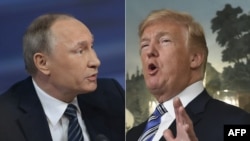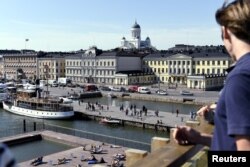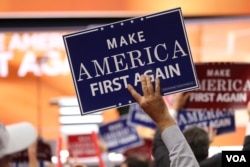As Russian President Vladimir Putin prepares for his first one-on-one summit with President Donald Trump in Helsinki this week, Russian political observers said Kremlin expectations are low but for one key issue: Russia’s symbolic return from international isolation to global powerbroker.
Ahead of the summit, President Trump — after a contentious week of meetings with traditional U.S. allies in Brussels and London — has suggested his talks with the Russian leader “may be the easiest of them all.”
Yet, Russian analysts warn that Trump will be faced with a shrewd negotiator whose arguments have been well-honed during his 18-year reign of power.
“For Putin, there’s always a way to repeat what he’s always said: ‘Russia has never done anything wrong. Russia does not have to improve or change anything,’” said Maria Lipman, Moscow-based editor of Counterpoint, a journal published by the Institute for European, Russian and Eurasian Studies at George Washington University.
“If America wants to change its policy, we welcome that. We have nothing to regret, nothing to correct,” she added, describing the Kremlin’s view in recent years.
Relations turnaround
The Helsinki summit comes amid a political fallout in often-contentious relations that nosedived over Russia’s annexation of Crimea in 2014 and further eroded over allegations of Russian interference in the 2016 U.S. presidential elections.
Russia’s actions in east Ukraine, Syria, and allegations the Kremlin may be responsible for the poisoning of a former Russian spy — and the related death of a British national just last week from a Russian-made nerve agent on British soil — has only exacerbated the distrust.
In the face of Kremlin denials, the Trump White House has nonetheless expelled dozens of Russian diplomats and ratcheted up sanctions, moves that have led Trump to claim “no one has been tougher on Russia than I have.”
Yet those penalties have often clashed with Trump’s oft-stated desire to improve relations with Moscow. It was Trump, observers note, who sent emissaries to Moscow to negotiate the summit with Putin on short notice.
Adding further intrigue, a federal investigation revealing the Trump campaign’s ties to Russian government surrogates amid his election to the White House in 2016.
Both Trump loyalists and the Kremlin have adamantly denied wrongdoing.
Optics, for now
Given that backdrop, Kremlin officials have joined the White House in setting the bar low for the upcoming summit.
“Putin does not expect too much from the summit from a practical point of view,” said Nadezhda Arbatova, a foreign policy specialist with the Institute for World Economy and International Relations in Moscow. “But the summit is important for Moscow, since it will be viewed as a recognition of Russia’s great power status.”
Less clear is what the two sides have to offer one another beyond platitudes aimed at better relations.
“There can be a compromise on Syria, if Russia agrees to American requirements in exchange for preserving (Syrian leader Bashar) al-Assad at his current position,” Arbatova said.
“As for Ukraine, no compromise is visible for the time being, since President Trump cannot lift sanctions while bypassing Congress,” she noted.
Officials on both sides have hinted at a possible deal on arms control, a goal both Trump and Putin have endorsed without mentioning specifics.
One thing that Kremlin officials don’t put much stock in: Trump’s tweet diplomacy, which has shown passing support for pro-Russian positions on everything from sanctions relief to recognizing Crimea as Russian territory.
“By now, there was quite enough evidence for Russia to realize that what Trump says should be taken with a grain of salt, to say the least,” Lipman said.
“I think everyone realizes that it cannot be taken as his intentions or U.S. policies, or even a declaration of intentions,” she said.
What Russians want
Key to Putin’s negotiating tactics: an insistence that Russia is no longer subject to American demands or pressure.
Yet some analysts argue that it is Russian public opinion that presents its own restraints on Putin.
“With Putin, there is no direct accountability, but policies are settled on what public opinion allows the government and Putin to do,” said Denis Volkov, a researcher at Levada Center, a leading independent polling research agency in Moscow.
A recent study co-authored by Volkov and the Moscow Carnegie Center showed Russians support their president’s combative stance with the West, while simultaneously are eager to lessen hostilities.
“People are getting tired of foreign policy, Putin’s foreign agenda. They want the state to spend more resources at home,” Volkov said. “The view of the majority is that we help other countries too much, spend on other countries too much, and it is time to spend more money at home.”
In other words, a Russian mirror of Trump’s own “American First” platform, where threats and largesse are doled out in pursuit of deals in the national interest.
“It’s not the case that Putin’s only legitimacy comes from confrontation,” Volkov said. “Legitimacy also comes from cooperation, if it's done in the proper way.”













